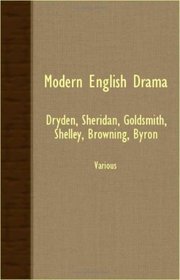Search -
Modern English Drama: Dryden, Sheridan, Goldsmith, Shelley, Browning, Byron
Modern English Drama Dryden Sheridan Goldsmith Shelley Browning Byron
Author:
INTRODUCTORY -- NOTE THE age of Elizabetlz, nenorable for so nzany reasons in the history of England, was eispecially brilliant in literature, and, within literature, in the dranla. With some falliftg off in spontaneity, the impulse to great dranzafic Production lasted till the Long Parliatnent closed the theaters in 1642 and wlaen they were reo... more »
Author:
INTRODUCTORY -- NOTE THE age of Elizabetlz, nenorable for so nzany reasons in the history of England, was eispecially brilliant in literature, and, within literature, in the dranla. With some falliftg off in spontaneity, the impulse to great dranzafic Production lasted till the Long Parliatnent closed the theaters in 1642 and wlaen they were reo... more »
ISBN-13: 9781408608968
ISBN-10: 1408608960
Publication Date: 10/26/2007
Pages: 448
Rating: ?
ISBN-10: 1408608960
Publication Date: 10/26/2007
Pages: 448
Rating: ?
0 stars, based on 0 rating




